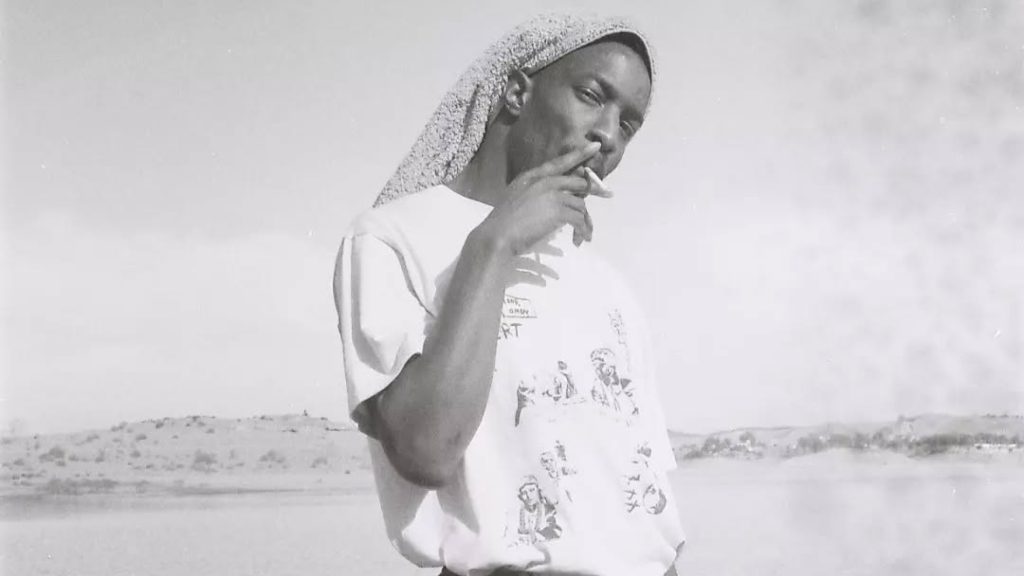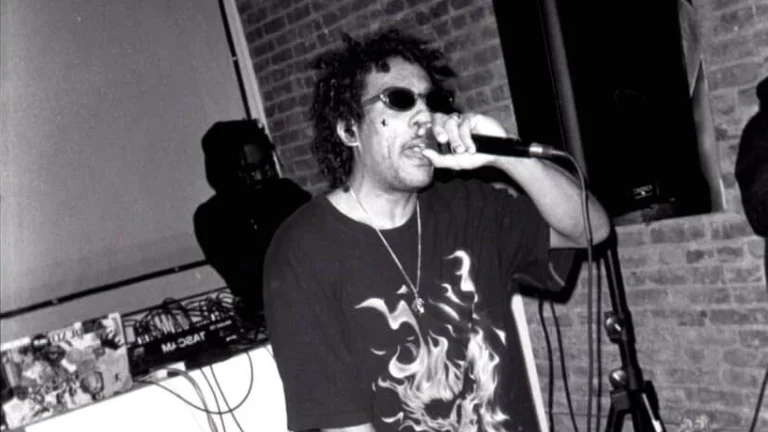You might think you know an artist when they’re set to release their seventh album in four years. Their sound might be easy to recognize, their writing catchy, their vocals cursive or operatic, and their songs follow the same structure. But Seigfried Komidashi breaks this mold.
Born in North West London, the visionary artist has six multidimensional, melodic, and thematic albums under his belt. He has been embedded in the underground music scene for a while now, collaborating with a range of rising artists from across the UK, including Sheffield rapper Lester Prox, London artist Bibi Isako Bisala, Welsh-born Chloe Beth Rogers, and Leeds singer Yusuf Yellow. Still, you’d be forgiven if he’s snuck under your radar.
Komidashi is a multitude of things, an amalgamation of his past, present, and future as he weaves jazz and hip-hop, poetry and prose, literature and nature. This is never more prominent than in his album 2023 black icarus, which uses an afro-surrealism framework to craft an hour-long audio-visual journey through time and space as it looks at the beauty and chaos of the universe and features extracts from the likes of Maya Angelou, James Baldwin, and Angela Davis. His sound is mercurial and fluid and even six albums into his solo career, it would be a mistake to think you know the first thing about him.
His back catalog is extensive as a solo artist, swinging from a cacophony of grating sounds on 2021 seasonal affections, and other curious melodies’ “cruel_waters” to the amalgamation of vocals and clippings on tracks like “dodging the belt !” and “bookclub !” The common thread tying these together is Komidashi’s talent for breaking the shackles of convention and creating something completely unexpected—to recognize a Komidashi song is to completely forgo your expectations of music.
Utilizing the sounds of jazz and avant-pop with complex chords and irregular beats, Komidashi leans into experimentalism, capturing music’s many different strokes.
Last summer, Komidashi spent a month being mentored by Kahil El’Zabar, the jazz multi-instrumentalist percussionist and has now put everything he learned into action. Recently, the Afrofuturist artist released two new singles from his upcoming album leopard under black sun from the British experimental label, Spinny Nights; “black unicorn (reprise),” a soft piano-led track with a tender poem weaved throughout and Komidashi’s vocals layered over the top, and “dance of osiris” which features composer Bibi Bisala and producer Adebola Oyekanmi connecting opposing melodies and the sound of waves before closing out with James Baldwin hauntingly poetic speech on love.
Ahead of leopard under black sun, out on the 28th, Komidashi spoke with Every DejaVu on the absurdity of his music, his identity, and honoring the past.
To start, can you tell us a little bit about yourself?
I’m a Yoruba boy, born in North West London and currently based in Walthamstow, northeast side. I’ve been playing music since I was a kid—recorder, brief flirtations with violin and guitar, then sax, oboe, keys, flutes—and started really making my own music when I was 15, 16 at school freestyling over SoundCloud beats and messing around over piano chords with my mates in the music practice rooms. My parents played music all the time when I was growing up so it’s always been present in my life. It’s been my primary vehicle of understanding myself and the world.
How would you describe your sound? How much of your music identity sits outside the realm of genre?
Honestly, I don’t know. Currently, it’s afro-surreal— playing around with the absurd and the mundane, with time and the interdependence of everything—I’m kind of happy for people to call it what they want and go from there. My musical identity is a chaotic patchwork of different points of reference—some jazz, some hip-hop, city pop, highlife, tezetas—but I feel like it’s something to be deconstructed and distorted and messed around with, a way of forcing people to question what music is and where it can take us.
For your 2023 album, black icarus, you crafted an audio-visual journey. How important is it to you to step outside the confines of what an album should sound like?
For me, I never really know what an album should sound like til it sounds like it—if that makes sense. It kind of just is always changing and shifting til there’s this moment of ‘Yeah, this is what this shit needs to sound like,’ and then I try and aim towards that feeling. There’s no real way an album should sound—the best albums are the ones that push you to reconsider what an album is.
What inspires this dedication to creating something completely new?
To be honest, every time I’ve ever tried to make something that sounded like something else it’s always ended up nothing like what I was aiming for. At a certain point, I said fuck it, and just started making whatever I felt like and hoped for the best! I enjoy pushing sounds and playing around with different genres, which is cool but more times means I have absolutely no idea what it actually is—it’s the space I feel most comfortable playing in creatively because it forces you to explore, learn, unlearn and repeat without trying to please or placate and to just create. At least in theory. In practice, this is much harder Lord knows!
black icarus features extracts from the likes of Maya Angelou, James Baldwin, and Angela Davis. Is it a conscious choice to include such pioneers of poetry and civil rights activists or is it a subconscious choice in that the excerpts come naturally to the songs you are creating?
The extracts are from people I’m reading or listening to at the time I’m making a project, again with this idea of reference points for each project. They serve as reminders of the Black radical tradition that my work aims to reflect and to be a part of. Often I’ll search for an interview and it will just fit, so I try not to overthink it and let it happen where it needs to.
How much do outside sources, or your other passions—poetry, literature, nature—inform your experimentalist sound?
They inspire my work hugely! Most of the time the songs will start with a poem I’ve written, then I’ll start messing around with different beats to try and capture the feeling and see what works. Nature serves as a good reset point, whether to listen to demos on a long walk or a bike ride through the city—it helps to orientate a project and gives a space to really listen to it and tap in. Literature is key too, I’m always reading so books often serve as an inspiration for a project, whether it be a feeling that a passage has, the themes invoked, or a character portrayal.
Your newest single “black unicorn (reprise)” is inspired by Audre Lorde’s poetry collection of the same name. Do you see yourself as simply a conduit for her poetry, a way of spreading her message, or do you like to interpret it in your own way?
Audre Lorde is my favorite poet. Her writing and prose are unmatched in the ways they both describe and empathize with states of being and feelings. The title is paying homage, an ode to the work as well as an attempt to mirror that same vulnerability and freedom of thought that her work inspires.
You often use sounds associated with avant-pop and jazz to infuse your music. Why do you lean towards this sound over others?
With jazz, it’s that freedom of expression, that furious intensity that has always drawn me towards it. As a kid, I stopped playing sax for three years after hearing Coltrane for the first time because it felt like there was nothing more to be said, but now I think I understand that jazz is an embodiment of radical tradition, of originality, and of freedom, so I’m always pushing towards this with my music.
I’ve never thought of my music as avant-pop so I’m not really sure—perhaps, that’s the Charli XCX True Romance fangirl in me shining through!
Is it important for you to honor the past as you look to the future?
I’d say it’s necessary. It’s impossible to conceive of a future without an acknowledgment of the past that came before it. Music, for me, exists in a non-euclidean space so the interplay of past and future is something to be experimented with and explored, whether that’s with stretching and distorting samples or referencing different traditional scales and modes when playing; all of the experimentation in my sound is engaging with this symbiosis to describe a present contingent on both past and future to exist.
What impact do you hope to make with your visionary creations?
The goal is to create spaces for people to feel something—what or how they feel is up to them—and to push their preconceived notions of sound and space, to distort stereotypes and play around with identity. There are no real endpoints in a non-euclidean space so it’s more about the journey in and of itself rather than where you end up.
Your new album, leopard under black sun, is released this month and features writer Lanaire Aderemi. How do you find relinquishing creative control? Do you prefer a collaborative environment or one where you work alone?
I feel like relinquishing control is essential to the act of creating something. For example, leopard under black sun started as just a title, and no idea of what it was going to sound like, and over three years later it’s only just become what it’s meant to be. For me, letting go of that desire to pre-plan and dictate terms is a necessary part of the process. Most of the time what I think the project is going to be and what the project is are completely different, and the lack of fixed control gives space for learning and growth, as well as a shitload of edits, apology emails about changing the project for the nth time and remasters of remasters. Laughs.
Working with Lanaire is always an absolute joy and blessing! She’ll usually send a poem across and from there it’s a case of finding the right home for it. “dancing in the archives” has maybe 4 or 5 completely different versions, so really I’m playing catch up trying to do her amazing writing justice!
Personally, I think one needs both—the space to collaborate and share and create with others, as well as a private space to reflect, lock-in, and grapple with the minutiae—creation is inherently tied to community but is also reliant on spaces of self-reflection and contemplation to truly be a symbiotic and harmonious act.





